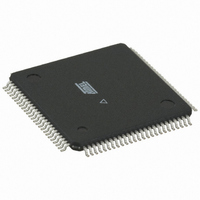ATMEGA256RZBV-8AU Atmel, ATMEGA256RZBV-8AU Datasheet - Page 440

ATMEGA256RZBV-8AU
Manufacturer Part Number
ATMEGA256RZBV-8AU
Description
MCU ATMEGA2560/AT86RF230 100TQFP
Manufacturer
Atmel
Series
ATMEGAr
Datasheets
1.ATMEGA640V-8CU.pdf
(38 pages)
2.ATMEGA640V-8CU.pdf
(444 pages)
3.AT86RF230-ZU.pdf
(98 pages)
Specifications of ATMEGA256RZBV-8AU
Frequency
2.4GHz
Modulation Or Protocol
802.15.4 Zigbee
Applications
ISM, ZigBee™
Power - Output
3dBm
Sensitivity
-101dBm
Voltage - Supply
1.8 V ~ 3.6 V
Current - Receiving
15.5mA
Current - Transmitting
16.5mA
Data Interface
PCB, Surface Mount
Memory Size
256kB Flash, 4kB EEPROM, 8kB RAM
Antenna Connector
PCB, Surface Mount
Package / Case
100-TQFP
Wireless Frequency
2.4 GHz
Interface Type
JTAG, SPI
Output Power
3 dBm
Operating Temperature Range
- 55 C to + 125 C
For Use With
ATAVRISP2 - PROGRAMMER AVR IN SYSTEMATJTAGICE2 - AVR ON-CHIP D-BUG SYSTEM
Lead Free Status / RoHS Status
Lead free / RoHS Compliant
Operating Temperature
-
Data Rate - Maximum
-
Lead Free Status / Rohs Status
Lead free / RoHS Compliant
For Use With/related Products
ATmega256
- Current page: 440 of 444
- Download datasheet (10Mb)
2549M–AVR–09/10
23 2-wire Serial Interface .......................................................................... 241
24 AC – Analog Comparator .................................................................... 271
25 ADC – Analog to Digital Converter ..................................................... 275
26 JTAG Interface and On-chip Debug System ..................................... 296
27 IEEE 1149.1 (JTAG) Boundary-scan ................................................... 302
23.1
23.2
23.3
23.4
23.5
23.6
23.7
23.8
23.9
24.1
24.2
25.1
25.2
25.3
25.4
25.5
25.6
25.7
25.8
26.1
26.2
26.3
26.4
26.5
26.6
26.7
26.8
26.9
27.1
27.2
Features ........................................................................................................241
2-wire Serial Interface Bus Definition ............................................................241
Data Transfer and Frame Format ..................................................................242
Multi-master Bus Systems, Arbitration and Synchronization .........................245
Overview of the TWI Module .........................................................................246
Using the TWI ................................................................................................249
Transmission Modes .....................................................................................252
Multi-master Systems and Arbitration ............................................................265
Register Description ......................................................................................266
Analog Comparator Multiplexed Input ...........................................................271
Register Description ......................................................................................272
Features ........................................................................................................275
Operation .......................................................................................................276
Starting a Conversion ....................................................................................277
Prescaling and Conversion Timing ................................................................278
Changing Channel or Reference Selection ...................................................282
ADC Noise Canceler .....................................................................................283
ADC Conversion Result .................................................................................288
Register Description ......................................................................................289
Features ........................................................................................................296
Overview ........................................................................................................296
TAP - Test Access Port .................................................................................297
Using the Boundary-scan Chain ....................................................................299
Using the On-chip Debug System .................................................................299
On-chip Debug Specific JTAG Instructions ...................................................300
Using the JTAG Programming Capabilities ...................................................301
Bibliography ...................................................................................................301
On-chip Debug Related Register in I/O Memory ...........................................301
Features ........................................................................................................302
System Overview ...........................................................................................302
ATmega640/1280/1281/2560/2561
v
Related parts for ATMEGA256RZBV-8AU
Image
Part Number
Description
Manufacturer
Datasheet
Request
R

Part Number:
Description:
DEV KIT FOR AVR/AVR32
Manufacturer:
Atmel
Datasheet:

Part Number:
Description:
INTERVAL AND WIPE/WASH WIPER CONTROL IC WITH DELAY
Manufacturer:
ATMEL Corporation
Datasheet:

Part Number:
Description:
Low-Voltage Voice-Switched IC for Hands-Free Operation
Manufacturer:
ATMEL Corporation
Datasheet:

Part Number:
Description:
MONOLITHIC INTEGRATED FEATUREPHONE CIRCUIT
Manufacturer:
ATMEL Corporation
Datasheet:

Part Number:
Description:
AM-FM Receiver IC U4255BM-M
Manufacturer:
ATMEL Corporation
Datasheet:

Part Number:
Description:
Monolithic Integrated Feature Phone Circuit
Manufacturer:
ATMEL Corporation
Datasheet:

Part Number:
Description:
Multistandard Video-IF and Quasi Parallel Sound Processing
Manufacturer:
ATMEL Corporation
Datasheet:

Part Number:
Description:
High-performance EE PLD
Manufacturer:
ATMEL Corporation
Datasheet:

Part Number:
Description:
8-bit Flash Microcontroller
Manufacturer:
ATMEL Corporation
Datasheet:

Part Number:
Description:
2-Wire Serial EEPROM
Manufacturer:
ATMEL Corporation
Datasheet:










